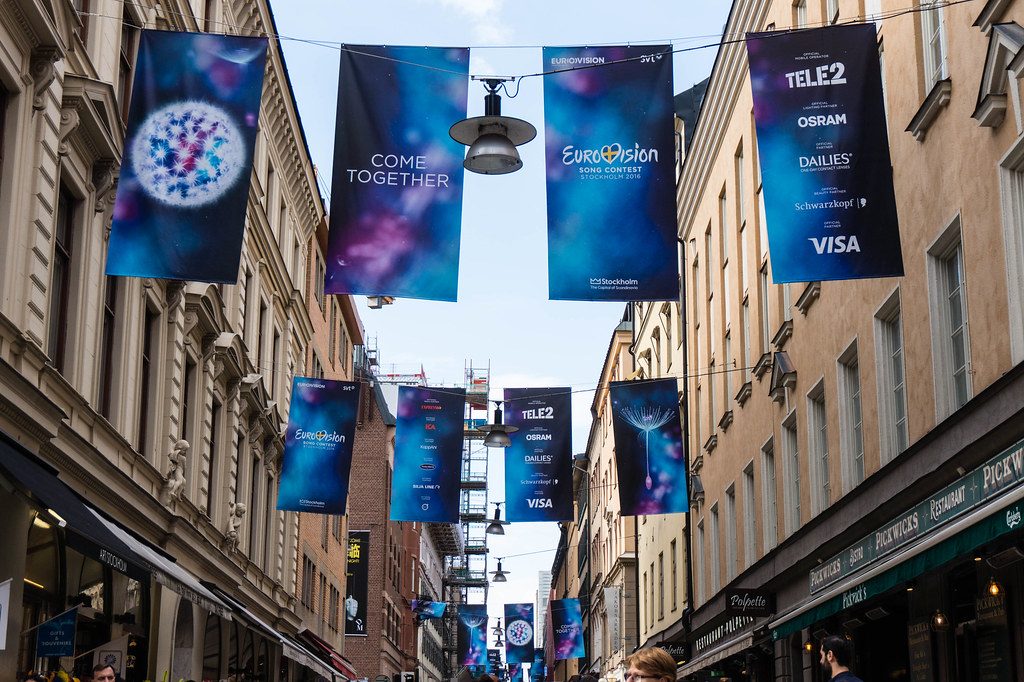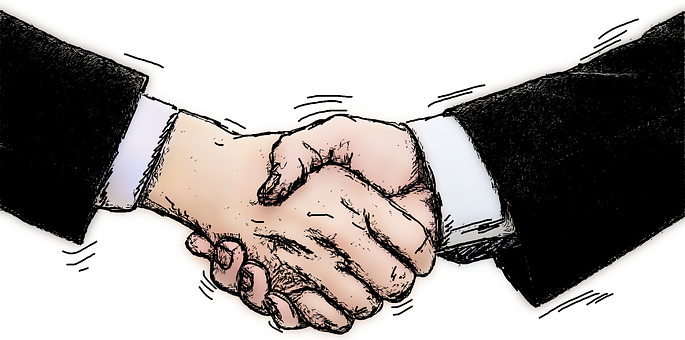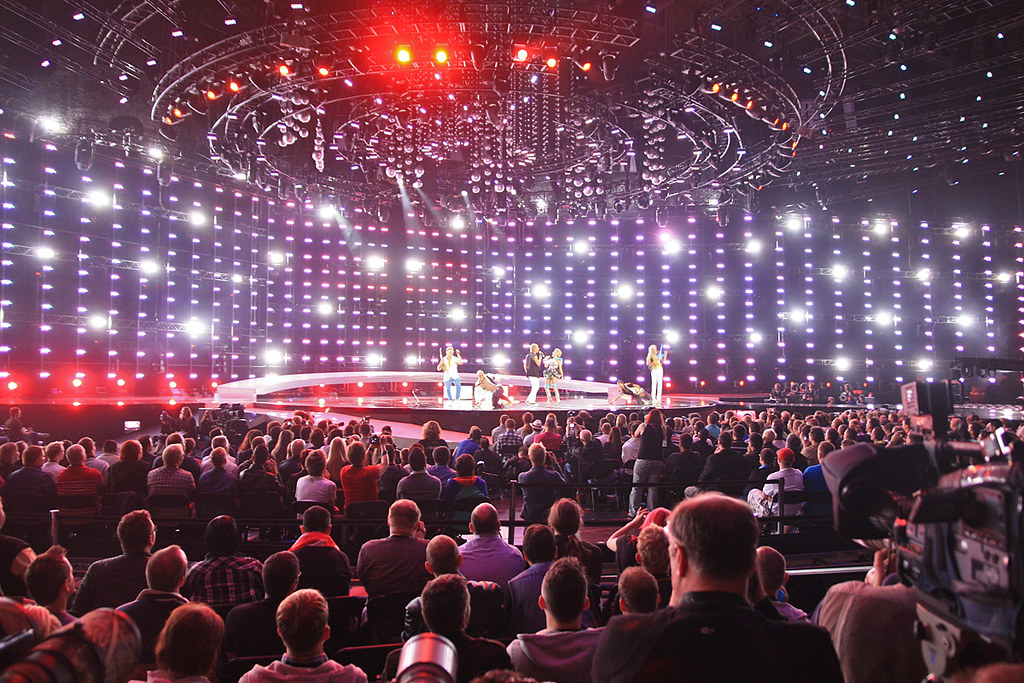In this edition we can see numerous examples of how music and (international) politics interlink. To date, music can be used as a way to mobilise people for the support of government organisations or revolutions. It is a means of supporting and expressing an identity, through national anthems or resistance songs.
We’ve heard all of that before. But what does it actually mean to be “political”? And, to turn the whole issue on its head: when is music not political anymore?
The Eurovision tunes
Let’s pay attention to an event that carries a significant political message to the cultural sphere: the Eurovision Song Contest. The name says it – “Eurovision” – it transports the vision of a European community, as Eurovision explains its own history:
“The Eurovision Song Contest was established 10 years after the Second World War to bring Europe closer together through music.”
But despite being concerned with such a big topic as European integration, the music contest ought to take place on the cultural level.
In the rules of Eurovision it says under point 2.6: “The ESC is a non-political event. All Participating Broadcasters, including the Host Broadcaster, shall ensure that all necessary steps are undertaken within in their respective Delegations and teams in order to make sure that the ESC shall in no case be politicized and/or instrumentalized.” This is a clear stance, although it has been questioned several times.
But thinking about the event itself, the message it sends, the rationales behind the national votings that are accused of being political etc. is another topic to talk about. I will turn today to a sentence later in that paragraph of the rules: “No lyrics, speeches, gestures of a political, commercial or similar nature shall be permitted during the ESC. No swearing or other unacceptable language shall be allowed in the lyrics or in the performances of the songs.” So far so good.

But then think about some of the performances from the past years. In 2014, Iceland participated with the song “No prejudice” by the band Pollapönk (one of the band members being an MP) that takes a stance against prejudices and for more tolerance. In 2018, the Israeli singer won with the feminist-themed song “Toy”. In 2019, the Norwegian contribution “Spirit in the Sky“ by KEiiNO incorporated traditional Sami Singing, to bring the indigenous people into the spotlight. In the same year, France was represented by the Singer Hassani and his song “Roi“ about valuing yourself and fighting discrimination.
This raises the more theoretical question of what it means to be political. When is a topic a purely social or cultural and when a political issue? Can you separate this clearly?
Define the political: capture a ghost?
When searching the term “politics” in online dictionaries and databases, most meanings refer to a narrow understanding that concerns the state system. It is associated with the activities of organisations and institutions, different parties and the governing of countries. The narrow, formal definition of politics concerns the state as the permanent institutions that enforces laws, provides public services etc. It is about the activities of politicians who serve the state temporarily (while the state remains).
Another understanding is seeing politics as a conflict: a process where differences coexist. When reading politics as a process, it is also viewed as a method to resolve conflicts (instead of resorting to violence or coercion). Political actions have to do with competition and gaining power. Understanding politics as exercising power though depends significantly on one’s definition of power.
In a broad definition, politics is understood as a social and public activity, as interaction and engagement with others and with a public orientation. Politics takes place between people of a society, which means that citizens can have a political opinion. Broader, informal understandings could incorporate the statements made by Eurovision songs, while the narrow definitions would not.
Though, the broader definitions get, there is an increased danger of a term losing its meaning- is every social interaction now political? All these definitions inhere some problems but also explain different aspects. Together, they might paint the full picture.

Noisy-famous protest sounds from Iceland
An interesting case at the last ESC is the Icelandic contribution by the group Hatari, with their song “Hatrið mun sigra” (“Hate will prevail”). The group is described as a political project and behind its eccentricity and artistic music is a motivation of criticising capitalism and modern consumer society.
Already before they became the representatives of Iceland, they announced to use in case of a national victory the ESC performance for a protest against Israeli politics. They challenged president Netanyahu to a Glíma competition (a Nordic version of Wrestling) with the Icelandic island community of Vestmannaeyjar as a price, to provoke. Political statements such as those might have brought them the sympathy of many Icelandic people: 2018 around 5% of the population signed a petition about not participating at the 2019 ESC because of the political situation of Israel.
During the ceremony of announcing the scores, Hatari was holding Palestine banners into the cameras, which they got a fine for because of violating the ESC rules.

After reading through the definitions of politics, can this band that is criticising with its performance and its actions one specific state as well as the neoliberal system that arguably runs the world, be defined as being political? Why do they get a fine for the banners, but were allowed to compete in the first place?
Infinite definition loop
As it is the case for many terms and concepts in social science, “politics” is a “contested concept”. In the same manner, this article will not propose one single definition – what is political is nothing singular or straightforward. Or, to put it into the words of the Oxford University Press: “Political is a ubiquitous and seemingly indispensable term in the discussion of human affairs. […] it it is difficult to say what, if anything, ‘political’ signifies in its various applications and how it signifies what it does.” When we listen to the tunes of ESC again next year we can therefore ask once more: where is the line of being political here?
by Nina Kolarzik
Photo Credits
Eurovision 2016 – Stockholm, johnpeart, CC BY-SA 2.0
Eurovision song contest 2010, kjelljoran, CC BY-NC-SA 2.0
Shaking Hands, 8385
Hatari, P1r, CC BY-NC-SA 2.0










